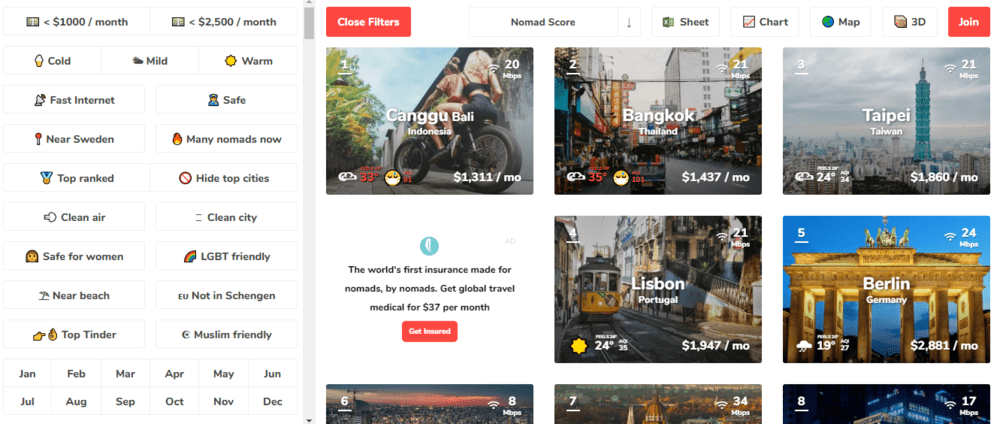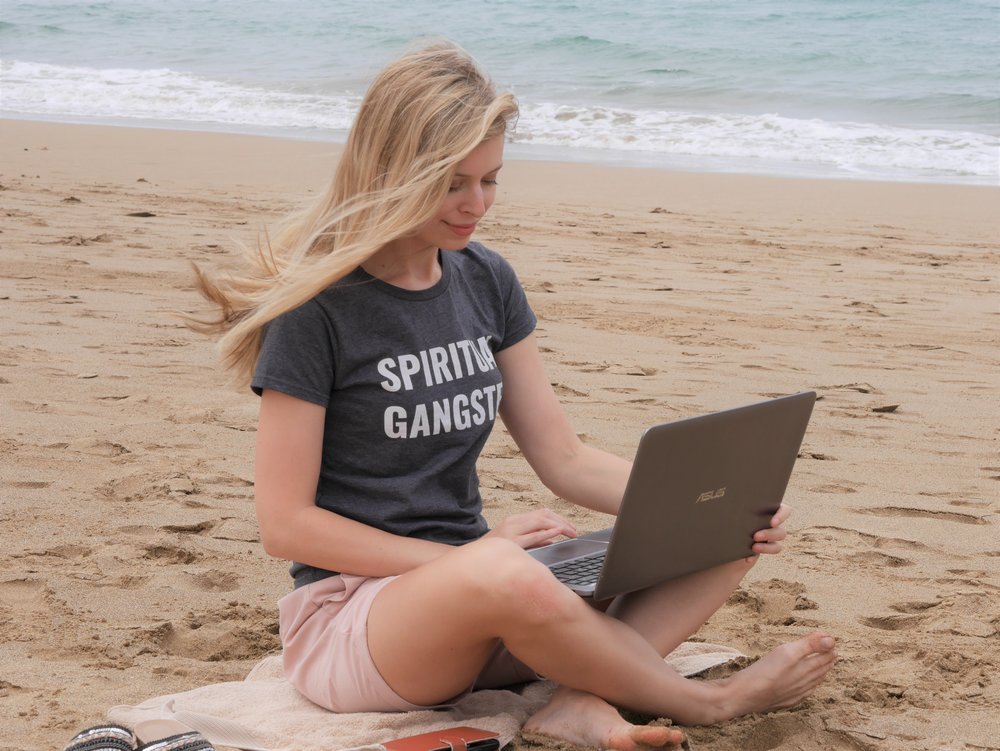One of the most common questions I get from my followers is how to create a location independent income that allows you to travel and work from anywhere.
It’s easier to become a digital nomad than you think, and in this post I have divided the journey into 7 simple steps.
Let’s dive in!

Let’s get into it!
Table of Contents
How To Become a Digital Nomad
1. Get inspired
JOIN DIGITAL NOMAD COMMUNITIES
A big part of being a successful digital nomad is being part of a strong digital nomad community. On Facebook there are many groups you can join for free.
Digital nomad communities
- Digital Nomads In Europe
- Digital Nomads Around The World
- Digital Nomads and Freedom Fighters
- Global Digital Nomad Network
- Digital Nomad Hub
- Digital Nomad Entrepreneurs
- Digital Nomad Girls Community
- Female Digital Nomads
- Women GoWonder
Job boards for digital nomads
- Digital Nomad Jobs Remote Job Opportunities
- Digital Nomads – Jobs and Opportunities
- Digital Nomad Jobs – Work From Anywhere
READ BOOKS
If you ask digital nomads what sparked their interest in this lifestyle, many will mention the 4-Hour Work Week by Tim Ferris. This book teaches you how to escape the rat race and live anywhere. A must-read for all aspiring digital nomads.
Another nomad classic is Vagabonding by Rolf Potts. He shatters the myth that you need to be rolling in money to be able to travel long-term. The book shows you how to finance your travels, adjust to life on the road and handle travel adversity.
Other books that will help you on your journey are Crush It! by Gary Vaynerchuk, The Art of Non-Conformity by Chris Guillebeau and $100 Start-up by the same author.
FOLLOW DIGITAL NOMADS ON SOCIAL MEDIA
Fill your Instagram feed with inspiration for your new lifestyle! I can recommend:
- Swedish Nomad
- Phil Wilson
- Christabella Travels
- Paul Thomson
- Nomadic Matt
- …and of course my own account The Spirit Nomad!
You can also follow digital nomad hashtags like:
#DigitalNomad
#DigitalNomads
#DigitalNomadLife
#NomadLife
#RemoteWork
#DigitalNomadGirls

2. Identify what you are good at
Now that you feel inspired and motivated to get started, the next step is to identify your skills.
Look back at what you learned during your study years and skills you have gained from your working life.
Even if you feel you have zero skills, you probably have something you are passionate about.
Whether that is card magic, raising alpacas or playing Fortnite, you can make online courses around your passion and sell online. So don’t discount your industry or your background and skills as “not course material”.
Another skill that everyone has is language. You can teach your mother tongue as an online language teacher on platforms like Italki and Verbling.
This is how I started out, and I still teach online. If there is a demand for Swedish, which is basically only spoken in a small country where every person can speak English, then there is definitely demand for your language too.
Skills that are extra useful as a remote worker are writing, marketing, and programming. So if you possess any of those skills then there are many remote jobs there out there that you are qualified for.

3. Build new skills
Now that you have identified what you are good at, it is time to learn the skills you need to become a digital nomad.
Whether you plan to work for a company, start your own business or freelance, you’ll need to build a certain skill set. It could be learning how to create online courses, build websites, teach a language online or how to create and sell e-books on Amazon.
Make sure you know all options before you decide on your digital nomad path. I have listed 99 digital nomad jobs and income ideas in this post.
And don’t worry, most digital nomad paths doesn’t require you to go back to college or university. Nowadays there are online courses on literally everything, which you can take at your own pace and at a much lower price than traditional education.
So how do we decide which digital nomad path to take? Ideally, it should be something you like to do, are good at AND something people are willing to pay for.
If you find it difficult to find this sweet spot, then just start with what you are already good at. For example, if you have translation experience but it’s not a big passion of yours, you could start off as a freelance translator.
Later down the road you can reflect on what would be your ultimate digital nomad path and make the plan then.
Here are some tips on how to stay productive as you are building your skills:
Where can I learn my new skill set?
The most popular course websites for learning digital skills are Udemy and Skillshare.
If you want to learn coding there are other websites focusing specifically on this skill, for free or very cheap. Codecademy, Team Treehouse and Free Code Camp are especially popular.

4. Reduce location ties and expenses
While you are developing your skill set, it’s time to start reducing location ties and expenses. Start eliminating credit card debt and subscription expenses like Netflix and gym membership.
If you are a member of a gym, take a look at the gym contract and make sure it won’t auto-renew when it expires.
Make a plan of what to do with your home when you leave for the road.
Will you continue paying the rent? Will you end the contract and move out? If you own your home, will you rent it out? Airbnb or long-term?

5. Get paid
- Freelancer
Most digital nomads start of as freelancers, finding gigs on online platforms like Upwork, Fiverr or People Per Hour.
Some instead choose to build their own website and direct traffic to the website with ads and reach out to potential customers directly. This takes more time to set up but could be more profitable in the long run, as the online platform takes a cut of your earnings.
- Online business
Eventually many nomads choose to expand their service into a business. For example, if they start of as a freelance Social media manager they might start a Social media agency.
As the company grows they might start hiring employees and outsourcing some tasks. Some people go straight to starting a business without going the freelance route.
If this is your plan, please don’t quit your office job just yet. Building a business can take time and can be risky, so you need the comfort of a stable income while building your business so you don’t need to worry if you will be able to pay your bills.
When you are earning enough from your business to not need your office, you can quit without stress.
I have listed 99 nomad income ideas here:
- Remote job
A third option is to simply get a normal job where you work for a company, usually 9-5, but where you work remotely instead of from their office. If you have an office job now that you like, you can try to negotiate a remote contract with your current company.
If your boss says no you can check out remote job boards. Here are some of the most popular:

6. Decide on a location
Now onto the fun part! Deciding where to go. Important things to take into consideration when deciding on where to go is:
- Speed of Internet and wifi
- Cost of living
- Accessibility and effectiveness of public transportation
- Weather
- Personal safety
- Entertainment options
Destinations that rank high in these and consequently are very popular amongst digital nomads are:
- Chiang Mai, Thailand
- Canggu, Bali
- Lisbon, Portugal
- Berlin, Germany
- Las Palmas, Spain
- Budapest, Hungary
I have been to all of these and can recommend them all. It all depends on your taste. Are you a city girl/boy or beach bum? Do you have a continent preference?
Is it important for you that the air is clean, the town is LGBT friendly or that the internet is super fast? To make the selection process easier, I recommend using Nomadlist.com. There you can choose the criterias of the place you want to go and it will then give you a list of places that match those.

For me personally, it’s important that the location is affordable, safe for women, has warm weather, a thriving digital nomad community and beaches of course! That is why I am going to Canggu in Bali next month. What’s your criteria?

7. Keep educating yourself
The ever-changing digital landscape means our learning journey never ends as digital nomads.
Stay updated on the latest trends in your market and niche by subscribing to newsletter, subscribing to relevant Youtubers and attend skill shares and meetups at home and when travelling.
A good website for finding these kinds of meetups is Meetup.com.
Bigger coworking spaces usually also organizes meetups. You will find the coworking spaces in your area by typing in the name of your town in Coworker.com. Then check out their Facebook pages and see if there are any upcoming events.
Another fun way of educating yourself and also network and connect with other digital nomads, is by attending digital nomad summits or retreats. They usually include co-living, access to coworking office(s), social activities and excursions.
Every week there are lectures and workshops on how to improve digital skills, mindset, goal-setting etc. Some of the most popular retreats and summits are:

Final thoughts
Becoming a digital nomad might feel like a distant dream but it’s easier than you think. Just follow the steps and don’t give up when things get hard. Because they will.
What successful people all have in common is not that they are good at winning, but that they dare to fail. Over and over. But still they stand up and keep on walking towards their dream.
If you really want to become a digital nomad I suggest you do the first step I outlined in this blog post already NOW. Then you have taken the first action step already today and only have six more to go until you are a full-fledged digital nomad, living your dream.
Are you thinking of becoming a digital nomad? Let me know in the comments!





